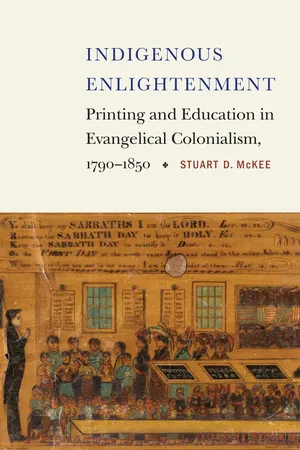
Indigenous Enlightenment
Printing and Education in Evangelical Colonialism, 1790–1850
- 544 pages
- English
- ePUB (mobile friendly)
- Only available on web
About This Book
In Indigenous Enlightenment Stuart D. McKee examines the methodologies, tools, and processes that British and American educators developed to inculcate Indigenous cultures of reading. Protestant expatriates who opened schools within British and U.S. colonial territories between 1790 and 1850 shared the conviction that a beneficent government should promote the enlightenment of its colonial subjects. It was the aim of evangelical enlightenment to improve Indigenous peoples' welfare through the processes of Christianization and civilization and to transform accepting individuals into virtuous citizens of the settler-colonial community. Many educators quickly discovered that their teaching efforts languished without the means to publish books in the Indigenous languages of their subject populations. While they could publish primers in English by shipping manuscripts to printers in London or Boston, books for Indigenous readers gained greater accuracy and influence when they stationed a printer within the colony. With a global perspective traversing Western colonial territories in the U.S.-Mexico borderlands, the South Pacific, Madagascar, India, and China, Indigenous Enlightenment illuminates the challenges that British and American educators faced while trying to coerce Indigenous children and adults to learn to read. Indigenous laborers commonly supported the tasks of editing, printing, and dissemination and, in fact, dominated the workforce at most colonial presses from the time printing began. Yet even in places where schools and presses were in synchronous operation, missionaries found that Indigenous peoples had their own intellectual systems, and most did not learn best with Western methods.
Frequently asked questions
Information
Table of contents
- Cover
- Title Page
- Copyright Page
- Dedication
- Contents
- List of Illustrations
- Acknowledgments
- Introduction
- 1. The Accession to Western Civility
- Part 1
- 2. The Foreign Mission School
- 3. The Central School of Imerina
- 4. Charity Schools and Common Schools
- 5. Pathshalas
- Part 2
- 6. Ako
- 7. Haapii
- Part 3
- 8. Learning to Print
- 9. Printing to Learn
- Part 4
- 10. Under Cover
- 11. Under Contract
- Part 5
- 12. Making News
- 13. Making Do
- Afterword
- Notes
- Bibliography
- Index
- About Stuart D. McKee